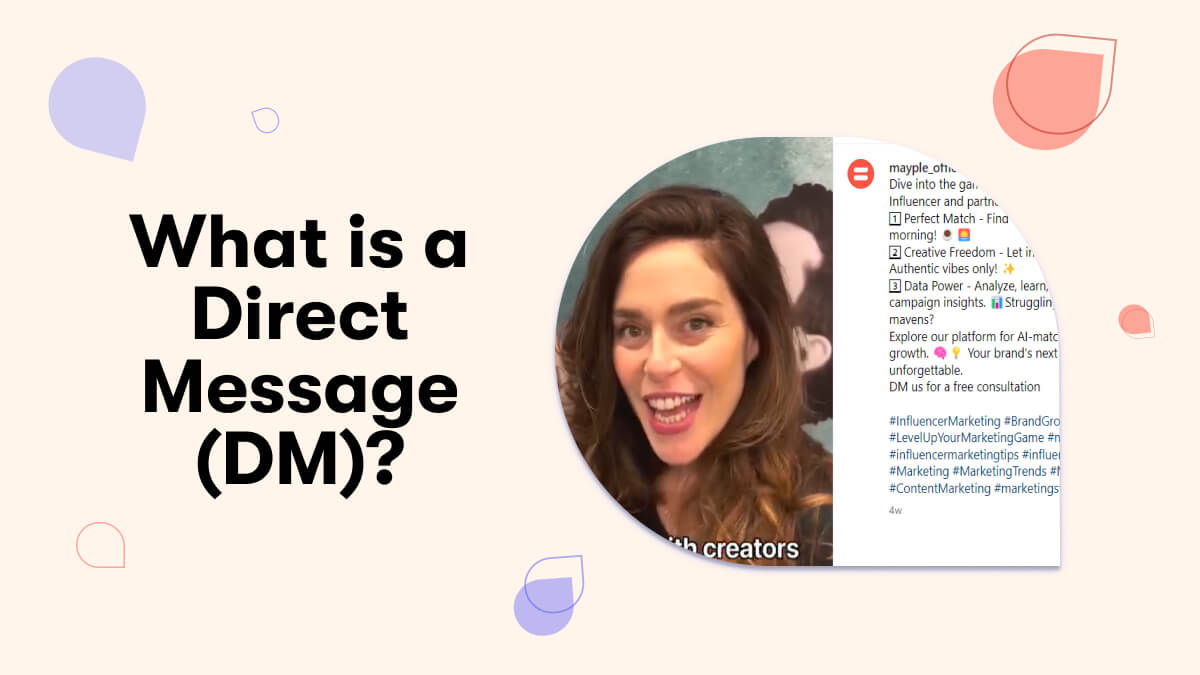What is a Direct Message (DM)?
A direct message or DM is the best way to engage with your online audience on social media. You can use it to reach out to potential customers, convert new leads, and build relationships.
Published April 10, 2024

Direct messages, often abbreviated as DMs, are a form of private communication between users on social media platforms and messaging apps. Unlike public posts or comments, DMs are not visible to others except the sender and the recipient, in the recipient's message inbox.
This feature allows for private conversations, sharing of sensitive information, or direct business communications.
Promotional messages where brands communicate with potential customers in their inboxes can be considered DMs as well, but they follow slightly different rules of engagement than direct messages between two individuals.
This type of marketing messages are a form of direct message marketing, wherein you, the brand sending out a personalized message, need to have consent from your recipient to communicate with them and be in their message inbox.
How DMs work on different platforms
Direct messages are similar across most social media platforms, with some differences:
- Facebook: On Facebook, DMs are facilitated through Messenger. Users can send messages, photos, videos, and links to individuals or groups. Messenger also supports voice and video calls. The platform offers various privacy settings, allowing users to control who can contact them directly.
- Instagram: Instagram's direct message feature enables users to send private messages, photos, videos, stories, and profiles information. Users can also create group chats. Instagram provides options like disappearing messages and the ability to send content from feeds directly as a DM.
- Twitter: Twitter allows users to send private messages known as direct messages or DMs to their followers or any user, depending on the recipient's privacy settings. These messages can include text, images, videos, and links. Twitter also supports group DMs, where users can have private conversations with multiple people.
On most platforms, unread messages are marked with a notification on the message icon. Clicking on this message icon when it has notifications attached to it leads to the direct message conversation that is unread or to the message inbox, from whence you can read your messages.
As a business, you can use DMs to receive messages from customers (such as for customer care), measure customer satisfaction and customer engagement, or to send offers for customers who have opted-in for communications from you.
This type of comms (via DMs) can help you build amazing customer experience and customer loyalty because it meets them where they are, on the social networks they already spend time on.
Pro tip: want to improve your DM game on Insta? Work with one of our top Instagram experts.
How DMs can be used in marketing
Direct, private messaging offers a personalized way to engage with customers, followers, and influencers. Brands can use DMs for customer service inquiries, providing personalized shopping advice, sending exclusive offers, soliciting feedback, and influencer outreach. This one-on-one interaction can enhance customer experience and build stronger relationships.
Make sure you aim for consistency in messaging -- the whole concept of internet messaging is here not just as a transactional feature, but as a branding element too. All the different messaging elements should be part of your business' brand, tone of voice, and overarching narrative. Private messaging with customers is not the same as peer messaging: it is an act of business communications.
When should you use DMs in marketing?
In business, direct messaging platforms should be used when personalization and privacy are paramount. They are ideal for:
- Addressing specific customer service issues.
- Sending personalized offers or messages to loyal customers.
- Reaching out to influencers for collaborations.
- Collecting feedback on products or services in a more private setting.
This type of communications opens new possibilities for businesses, allowing them to reach their business goals, maintain and grow business reputations,
Best practices for sending DMs as a brand
If you want to use direct messaging to reach your business objectives, keep the following tips in mind:
Permission-based messaging
Always ensure the recipient of your direct messaging has agreed to receive messages from your brand to avoid being intrusive. So make sure to get consent before you message your followers on any social media platform.
Keep in mind that these are social media channels for users. While connections among users might follow the regular use of social engagement, messaging them without consent, as a business, can be perceived as pushy and intrusive.
Personalization
Tailor your messages to the recipient's interests, previous interactions, or purchase history to show genuine interest and attention. For instance, if you message someone as part of a nurturing campaign, make sure you send them exclusive content -- information that's suitable for their industry, interests, and pain points.
Prompt responses
Be responsive. Good response times can significantly enhance customer experience and satisfaction. The more you leave your customers hanging, the less they will appreciate it.
And while sometimes it might all seem like it's the busiest time in the world, maintaining correct expectations can make all the difference in the world. For instance, setting up a bot to reply to every message with a simple "We will get back to you within 24 hours" can ease off customer anxiety and build loyalty.
Professionalism
Maintain a professional tone, even in a casual setting. Proper language and grammar reflect on your brand's image. Social media users are more relaxed than, say, the recipients of a corporate letter -- but that doesn't mean you shouldn't be professional.
Clear purpose
Each message should have a clear purpose or call-to-action. Whether it's to inform, solicit feedback, offer assistance, or send offers, the recipient should understand why they're receiving the message.
Respect privacy
Be mindful of the information you request or discuss in DMs. Sensitive information should be handled with the utmost care and professionalism. Your DMs are a private space for communication -- and it should be treated as such.
The same general rule applies to everything you do online (including, but not limited to engaging your audience through DMs). For instance, if you want to employ user-generated content, make sure you ask for permission from content creators -- just because they posted something about your brand online, it doesn't mean you have the right to share it with your own audience.






